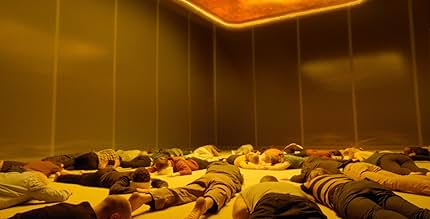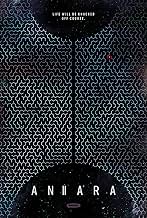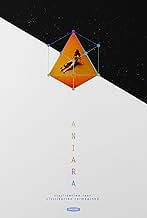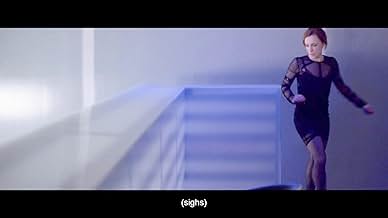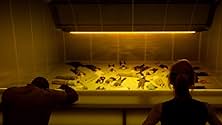AVALIAÇÃO DA IMDb
6,3/10
14 mil
SUA AVALIAÇÃO
Uma nave que transporta aos primeiros habitantes de Marte se sai de curso e obriga aos passageiros a considerar seu futuro.Uma nave que transporta aos primeiros habitantes de Marte se sai de curso e obriga aos passageiros a considerar seu futuro.Uma nave que transporta aos primeiros habitantes de Marte se sai de curso e obriga aos passageiros a considerar seu futuro.
- Direção
- Roteiristas
- Artistas
- Prêmios
- 11 vitórias e 10 indicações no total
Emelie Garbers
- Mimaroben
- (as Emelie Jonsson)
- Direção
- Roteiristas
- Elenco e equipe completos
- Produção, bilheteria e muito mais no IMDbPro
Avaliações em destaque
This is based on a much-loved poem in Swedish written in 1956 (when my school debating club seriously considered "That man will never reach the moon"). Bear that in mind and much makes sense - more sense than the poem ever did to me when I first tried to read it. Much that purports to be science is just poetry. The film-makers have made some attempt to update the plot and the setting, bearing in mind that we have all seen 2001: a Space Odyssey..
The science is still cheesy. The ship has lost all its fuel, but power is uninterrupted and water is abundant (there is not only an extended lesbian shower scene, but a 20m swimming pool!). The architecture of the ship is absurdly angular, but nothing ever springs a leak. The ship's interior has been compared to a shopping mall and a cruise ship, but manufactured goods never show any sign of running out, and the whole thing seems absurdly understaffed.
It's basically an exploration of how an isolated group of people copes when it is cut off from Earth, its memories and hope. The main characters are sufficiently well drawn to explore these themes in, for me, a satisfying way. On those terms, it does well and is worth watching, though you must fill the hints in the chapter headings with your own deductions.
The science is still cheesy. The ship has lost all its fuel, but power is uninterrupted and water is abundant (there is not only an extended lesbian shower scene, but a 20m swimming pool!). The architecture of the ship is absurdly angular, but nothing ever springs a leak. The ship's interior has been compared to a shopping mall and a cruise ship, but manufactured goods never show any sign of running out, and the whole thing seems absurdly understaffed.
It's basically an exploration of how an isolated group of people copes when it is cut off from Earth, its memories and hope. The main characters are sufficiently well drawn to explore these themes in, for me, a satisfying way. On those terms, it does well and is worth watching, though you must fill the hints in the chapter headings with your own deductions.
This is a type of apocalyptic storytelling that is so beautiful. It doesn't hinge on false futurisms or morality - it is based on the sorrows that define our lives when we lose all hope. A slow burn that is so worth the indulgence.
'Aniara', the film made in 2018 by the Swedes Pella Kagerman and Hugo Lilja has the ambition of being a cosmic saga of proportions, a film in which a lot of talent, energy and hopes have been invested. The action takes place entirely on a spaceship, but not the exploration of space concerned the two authors (screenwriters and directors) of the film. Even though quite a lot has been invested in building a spaceship model that competes with similar ones in American movies, and even if the sets and props manage to create an interesting imaginary world, it is clear that the authors' attention has focused on the fate of some of the heroes and on the way they face an extreme situation, in which plans for the future are canceled or at best postponed, and the present becomes an infinite journey through a deserted space. 'Aniara' is at the same time a saga but also a story about people's reactions and the evolution of their relationships in extreme conditions.
The story of the film takes place in the near and foreseeable future in which the Earth has become either too small or uninhabitable for mankind, and a part of the population colonizes the planet Mars. Space ship Aniara is a kind of a Titanic of those times, a huge luxury space carrier, with all the comfort necessary for the three months of travel. The main heroine of the film, Mimaroben (or MR - Emelie Garbers) is the operator of a cyber salon (I am looking for a suitable term) called MIMA that combines virtual reality with artificial intelligence to offer passengers personalised experiences reminiscent of the natural ambience of the lost earthly paradise. The journey is suddenly disrupted by an incident caused by 'cosmic garbage' in which the huge space shuttle loses its ability to control the trajectory. Passengers are told that instead of three months the journey will take two years, but in fact this information is also inaccurate, because in reality the spacecraft is simply drifting in the infinite cosmic ocean. Thousands of passengers and crew members only gradually find out the truth and realize that their journey may take an eternity. The social environment that combines tourist efficiency with Scandinavian civilisation is gradually falling apart. MIMA transforms from escapist entertainment into a hallucinatory drug and object of worship. How long will the machines last? How long will people last? What happens to our civilisation when it is removed forever from the environment in which we were born?
What I liked. The film raises many interesting issues and opens up discussions worth undertaking. Emelie Garbers assumes excellently the lead role, with twists and turns of destiny that combine the collective experience with the personal one. The narrative construction is solid, even if the outcome is somewhat predictable. The sets of the impressing 'cosmic mall' traveling through space and degrading as hopes are shattered, civilisation disintegrates and violence, despair and superstition take over the survivors are presented gradually and interestingly. What I liked less. With the exception of MR, the rest of the characters are either schematically constructed (the captain of the expedition played by Arvin Kananian) or insufficiently psychologically justified (the heroine's partner - Bianca Cruzeiro). There is also a poetic thread (the film is based on a poem by a famous Swedish poet) that is lost, and the metaphor of the MIMA system (perhaps inspired by Stanislaw Lem and Tarkovsky's 'Solaris') fails to convince.
'Aniara' is an ambitious project that offers a space saga different from action movies, with less special effects and more ideas and directions for thougt and discussion. The heroes of the film are not space explorers but passengers, ordinary people like us, suddenly faced with the problems of existence and survival. Even if the execution is not perfect, even if many of the action threads are suddenly interrupted or lead nowhere, it is an interesting film for science fiction fans and not only for them.
The story of the film takes place in the near and foreseeable future in which the Earth has become either too small or uninhabitable for mankind, and a part of the population colonizes the planet Mars. Space ship Aniara is a kind of a Titanic of those times, a huge luxury space carrier, with all the comfort necessary for the three months of travel. The main heroine of the film, Mimaroben (or MR - Emelie Garbers) is the operator of a cyber salon (I am looking for a suitable term) called MIMA that combines virtual reality with artificial intelligence to offer passengers personalised experiences reminiscent of the natural ambience of the lost earthly paradise. The journey is suddenly disrupted by an incident caused by 'cosmic garbage' in which the huge space shuttle loses its ability to control the trajectory. Passengers are told that instead of three months the journey will take two years, but in fact this information is also inaccurate, because in reality the spacecraft is simply drifting in the infinite cosmic ocean. Thousands of passengers and crew members only gradually find out the truth and realize that their journey may take an eternity. The social environment that combines tourist efficiency with Scandinavian civilisation is gradually falling apart. MIMA transforms from escapist entertainment into a hallucinatory drug and object of worship. How long will the machines last? How long will people last? What happens to our civilisation when it is removed forever from the environment in which we were born?
What I liked. The film raises many interesting issues and opens up discussions worth undertaking. Emelie Garbers assumes excellently the lead role, with twists and turns of destiny that combine the collective experience with the personal one. The narrative construction is solid, even if the outcome is somewhat predictable. The sets of the impressing 'cosmic mall' traveling through space and degrading as hopes are shattered, civilisation disintegrates and violence, despair and superstition take over the survivors are presented gradually and interestingly. What I liked less. With the exception of MR, the rest of the characters are either schematically constructed (the captain of the expedition played by Arvin Kananian) or insufficiently psychologically justified (the heroine's partner - Bianca Cruzeiro). There is also a poetic thread (the film is based on a poem by a famous Swedish poet) that is lost, and the metaphor of the MIMA system (perhaps inspired by Stanislaw Lem and Tarkovsky's 'Solaris') fails to convince.
'Aniara' is an ambitious project that offers a space saga different from action movies, with less special effects and more ideas and directions for thougt and discussion. The heroes of the film are not space explorers but passengers, ordinary people like us, suddenly faced with the problems of existence and survival. Even if the execution is not perfect, even if many of the action threads are suddenly interrupted or lead nowhere, it is an interesting film for science fiction fans and not only for them.
I had... great expectations. The poem made a profound impression on me as a young boy when I read it the first time at around 12 or 13 years of age. The vision of the ship with its hapless passengers drifting endlessly across the infinite void, unable to change their ultimate destiny, descending into inevitable darkness struck a chord that still reverberates within me decades later.
Unfortunately the directors lost the ball. Instead of a much anticipated visual retelling of the epic poem we get bad acting and strange decisions on the cutting board. It seems to me the problem with the actors is that they seem to have been recruited more or less directly from the theatre, obviously a forum they are more comfortable with. The dialog is presented in a strange intonation making it stilted and unnatural. It feels false, recited rather than truly experienced. Neither are the characters given much room to become people in the eyes of the audience. Mostly they lack depth and feel more like paper cutouts, hastily put in place and given a token smear of storyline just enough to separate them from the others, rather than as real living people. Transitions between scenes ar... BLAM STOP BLACK SCREEN almost in the middle of a sentence and then a written text proclaiming the next chapter. So strange. So unnatural. So disruptive.
Yes, the movie had a limited budget which explains some of the shortcuts that had to be taken, but... 20 million actually is quite substantial sum as the story doesn't need much in the way of special effects or expensive sets, not really. The focus on the poem is not on the surroundings or the interior of the ship, but on the interactions between the people on board. No, lesbochock nudity and explicit orgies does not cover the vast rifts in the storytelling, though predicibly the attempt was made. The end result isn't bad, not really. It's worse, it's meh. Meh meh meh.
No, I am not a script writer, nor a director, in fact I have no experience with film making but... this could have been done better. So much better. So disappointed.
Unfortunately the directors lost the ball. Instead of a much anticipated visual retelling of the epic poem we get bad acting and strange decisions on the cutting board. It seems to me the problem with the actors is that they seem to have been recruited more or less directly from the theatre, obviously a forum they are more comfortable with. The dialog is presented in a strange intonation making it stilted and unnatural. It feels false, recited rather than truly experienced. Neither are the characters given much room to become people in the eyes of the audience. Mostly they lack depth and feel more like paper cutouts, hastily put in place and given a token smear of storyline just enough to separate them from the others, rather than as real living people. Transitions between scenes ar... BLAM STOP BLACK SCREEN almost in the middle of a sentence and then a written text proclaiming the next chapter. So strange. So unnatural. So disruptive.
Yes, the movie had a limited budget which explains some of the shortcuts that had to be taken, but... 20 million actually is quite substantial sum as the story doesn't need much in the way of special effects or expensive sets, not really. The focus on the poem is not on the surroundings or the interior of the ship, but on the interactions between the people on board. No, lesbochock nudity and explicit orgies does not cover the vast rifts in the storytelling, though predicibly the attempt was made. The end result isn't bad, not really. It's worse, it's meh. Meh meh meh.
No, I am not a script writer, nor a director, in fact I have no experience with film making but... this could have been done better. So much better. So disappointed.
On one level this movie is a success. It's an engaging, non-commercial Sci-fi film that is well acted, directed and produced. It held my attention and made me want to find out the fate of the ship and crew.
I knew nothing of the poem. I knew nothing other than what the trailer contained. It is incredibly difficult to adapt a poem which is tied more than any other literary form to the word, into a mostly visual medium. Since the screenwriter seemed to jettison the words of the poem what we are left with is an outline. That's where some problems begin. The poem was written in 1956, when space travel hadn't even started. So, it's pretty lame when a space ship the size of the Aniara doesn't have redundant power and a number of backup plans for when/if things go wrong. But hey, we're already in outer space, disbelief is suspended, so, shut the hell up. There's a bunch character driven scenes but none of character ever develop. The really all stay the same no matter what they've been through. Also Instead of a fully developed story we get inundated with a series of let downs which really come off as more of a drag than tragic. I mean would it really be that bad to be traveling through space? The filmmakers certainly seem sure it is. There's some poignant moments throughout, to be sure. The problem is it's all for a movie that just peters out. What may have had great resonance on the page doesn't make it through the translation to screen.
I think if they had stronger conclusion to what happens to the main character at the end the movie would've worked better. That way the ultimate ending would've become a post script. That didn't happen, so we're left with a movie that just stops on some sort of note about 'the vastness of space'.
All this makes 'Aniara' unsatisfying even though it's well done on many levels.
I knew nothing of the poem. I knew nothing other than what the trailer contained. It is incredibly difficult to adapt a poem which is tied more than any other literary form to the word, into a mostly visual medium. Since the screenwriter seemed to jettison the words of the poem what we are left with is an outline. That's where some problems begin. The poem was written in 1956, when space travel hadn't even started. So, it's pretty lame when a space ship the size of the Aniara doesn't have redundant power and a number of backup plans for when/if things go wrong. But hey, we're already in outer space, disbelief is suspended, so, shut the hell up. There's a bunch character driven scenes but none of character ever develop. The really all stay the same no matter what they've been through. Also Instead of a fully developed story we get inundated with a series of let downs which really come off as more of a drag than tragic. I mean would it really be that bad to be traveling through space? The filmmakers certainly seem sure it is. There's some poignant moments throughout, to be sure. The problem is it's all for a movie that just peters out. What may have had great resonance on the page doesn't make it through the translation to screen.
I think if they had stronger conclusion to what happens to the main character at the end the movie would've worked better. That way the ultimate ending would've become a post script. That didn't happen, so we're left with a movie that just stops on some sort of note about 'the vastness of space'.
All this makes 'Aniara' unsatisfying even though it's well done on many levels.
Você sabia?
- CuriosidadesThe film is based on a 1956 poem by Swedish writer Harry Martinson. The epic, book-length poem has 103 cantos.
- Trilhas sonorasTundra
by Alexander Berg
Performed by Dorisburg
Principais escolhas
Faça login para avaliar e ver a lista de recomendações personalizadas
- How long is Aniara?Fornecido pela Alexa
Detalhes
Bilheteria
- Faturamento bruto nos EUA e Canadá
- US$ 40.124
- Fim de semana de estreia nos EUA e Canadá
- US$ 19.297
- 19 de mai. de 2019
- Faturamento bruto mundial
- US$ 40.124
- Tempo de duração
- 1 h 46 min(106 min)
- Cor
- Proporção
- 2.39:1
Contribua para esta página
Sugerir uma alteração ou adicionar conteúdo ausente





